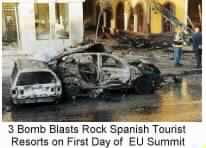HIGHLIGHTS: Spain Seeking to Tighten Noose on ETA Both at Home & Abroad||ETA, Seeking a Basque Homeland Kills 800 People Since 1968||EU Leaders Approve Preliminary Plan for Joint Action on Immigration|| STORY: ETA has raised the stakes in its battle for a Basque homeland with three bomb blasts in Spain coinciding with a European Union summit in Seville.
One British holidaymaker was seriously wounded and seven other people -- including three children -- suffered light injuries in the Friday attacks at two beach resorts on the southern coast and the northeastern city of Zaragoza.
ETA, listed as a terrorist organization by the EU, has been hit by a police crackdown in Spain, which has sent more than 100 people to prison this year.
It returned to the attack with a vengeance as Spain hosted a two-day summit ending on Saturday marking its last hurrah as EU president under the 15-nation bloc's six-month rotating system.
ETA has killed more than 800 people since 1968, first to strike back at repression under dictator Generalismo Francisco Franco, and then after his death in 1975 in a bloody drive for a Basque state in northwestern Spain and southwest France.
It resumed its violent attacks in January 2000 after a 14-month cease-fire that failed to lead to peace.
SUMMIT SECURITY TIGHT
It would be difficult to increase security at the summit, where presidents and prime ministers gathered under heavy guard.
But the bombs were clearly a distraction, and host Prime Minister Jose Maria Aznar is likely to face unwelcome questions about ETA at Saturday's closing summit news conference.
Aznar, who survived an ETA car bomb before he was first elected prime minister in 1996, has engineered a hardline policy against the group, offering virtually no concessions during the 14-month cease-fire.
He has wide popular support in Spain for his policy of cracking down with police while seeking to tighten the noose around ETA and its supporters.
Aznar is seeking to ban the radical Basque political party Batasuna, ETA's political ally accused by the government of funneling state funds to the separatist guerrillas.
Aznar also has won support from elsewhere in Europe, notably France, in targeting ETA activity outside Spain.
That has led not only to a series of arrests in France and a handful of other European countries, but last December the EU also agreed to follow the United States and add ETA to its list of the world terrorist organizations.
EU LEADERS REACH FOR IMMIGRATION DEAL
Meanwhile, leaders of the European Union are expected to produce a joint action plan against illegal immigration during the second day of their summit (Saturday) in Seville.
Britain, Spain and Germany have been forced to give way on tough measures in the light of French and Swedish opposition.
EU leaders will also review plans to expand membership to countries in central and Eastern Europe in 2004, and the redesign of the EU's decision-making processes.
PHOTO CAPTION
Police search for clues in front of a hotel in Fuengirola on Spain's Costa del Sol after car bombs rocked two Spanish tourist resorts June 21, 2002, injuring at least six people in attacks by suspected Basque separatists timed to coincide with the start of a European Union summit in Seville. Officials said they received a telephoned warning in the name of ETA before the first blast, which blew in windows at the hotel in the popular beach resort of Fuengirola, near the southern coastal city of Malaga. (Paolo Dalmazzo/Reuters)
- Author:
& News Agencies - Section:
WORLD HEADLINES


 Home
Home Discover Islam
Discover Islam Quran Recitations
Quran Recitations Lectures
Lectures
 Fatwa
Fatwa Articles
Articles Fiqh
Fiqh E-Books
E-Books Boys & Girls
Boys & Girls  Hajj Rulings
Hajj Rulings Hajj Fatwas
Hajj Fatwas














